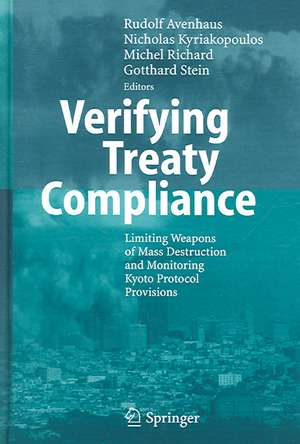Verifying Treaty Compliance: Limiting Weapons of Mass Destruction and Monitoring Kyoto Protocol Provisions
Editat de Rudolf Avenhaus, Nicholas Kyriakopoulos, Michel Richard, Gotthard Steinen Limba Engleză Hardback – 23 mai 2006
| Toate formatele și edițiile | Preț | Express |
|---|---|---|
| Paperback (1) | 1064.34 lei 38-45 zile | |
| Springer Berlin, Heidelberg – 13 oct 2010 | 1064.34 lei 38-45 zile | |
| Hardback (1) | 1239.49 lei 6-8 săpt. | |
| Springer Berlin, Heidelberg – 23 mai 2006 | 1239.49 lei 6-8 săpt. |
Preț: 1239.49 lei
Preț vechi: 1511.58 lei
-18% Nou
Puncte Express: 1859
Preț estimativ în valută:
237.17€ • 247.63$ • 196.29£
237.17€ • 247.63$ • 196.29£
Carte tipărită la comandă
Livrare economică 04-18 aprilie
Preluare comenzi: 021 569.72.76
Specificații
ISBN-13: 9783540338536
ISBN-10: 3540338535
Pagini: 643
Ilustrații: XIV, 629 p.
Dimensiuni: 155 x 235 x 37 mm
Greutate: 1.07 kg
Ediția:2006
Editura: Springer Berlin, Heidelberg
Colecția Springer
Locul publicării:Berlin, Heidelberg, Germany
ISBN-10: 3540338535
Pagini: 643
Ilustrații: XIV, 629 p.
Dimensiuni: 155 x 235 x 37 mm
Greutate: 1.07 kg
Ediția:2006
Editura: Springer Berlin, Heidelberg
Colecția Springer
Locul publicării:Berlin, Heidelberg, Germany
Public țintă
ResearchDescriere
International treaties requiring binding commitments on the part of the member states and appropriate compliance verification by an international authority constitute a primary assurance against risks posed by the spread of sensitive technologies that can be used to produce weapons of mass destruction or risks posed by climate changes due to global human activities. This book presents in an interdisciplinary manner experts' analyses
and views of existing verification systems: It gives guidelines and advice for the improvement of those systems as well as for new challenges in the field.
and views of existing verification systems: It gives guidelines and advice for the improvement of those systems as well as for new challenges in the field.
Cuprins
Conceptual Framework.- Conceptual Framework.- Treaties and their Requirements.- Arms Control and Non-Proliferation Treaties: An Ontology of Concepts and Characteristics.- International Atomic Energy Agency Safeguards under the Treaty on the Non-Proliferation of Nuclear Weapons: Challenges in Implementation.- Verification under the Chemical Weapons Convention.- Biological Weapons Convention.- Comprehensive Nuclear-Test-Ban Treaty Verification.- Treaty on Conventional Forces in Europe.- Developing the Climate Change Regime: The Role of Verification.- Field Experience.- Experience and Challenges in Weapons of Mass Destruction Treaty Verification: A Comparative View.- A Concrete Experience: The Iraq Case.- Beyond Iraq: The New Challenges to the Nuclear Non Proliferation Regime.- Formal Models of Verification.- Formal Models of Verification.- Systems and Linkages - Crosscutting.- Civil Reconnaissance Satellites: Opportunities and Challenges.- Change Detection: The Potential for Nuclear Safeguards.- Aspects of Networking: Experience from Global Monitoring for Security and Stability.- Environmental Sample Analysis.- Tracing the Origin of Diverted or Stolen Nuclear Material through Nuclear Forensic Investigations.- Information Collection and Analysis.- The Information Infrastructure of a Treaty Monitoring System.- The International Level.- Open Source Information Collection, Processing and Applications.- The National Level.- Emerging Verification Technologies.- Advanced Sensor Technologies.- Monitoring Reactors with Cubic Meter Scale Antineutrino Detectors.- Digital Verification Techniques in the Nuclear Safeguards System: Status and Perspectives.- Emerging Verification Technologies.- A Sustainable Approach for Developing Treaty Enforcement Instrumentation.- Perspectives and Conclusions.- Continuity and Change in International Verification Regimes.- Improving Verification: Trends and Perspectives for Research.- Concluding Remarks.
Caracteristici
Understanding present verification systems in order to improve their efficiency and effectiveness, and getting guidelines for new verification systems
Includes supplementary material: sn.pub/extras
Includes supplementary material: sn.pub/extras












